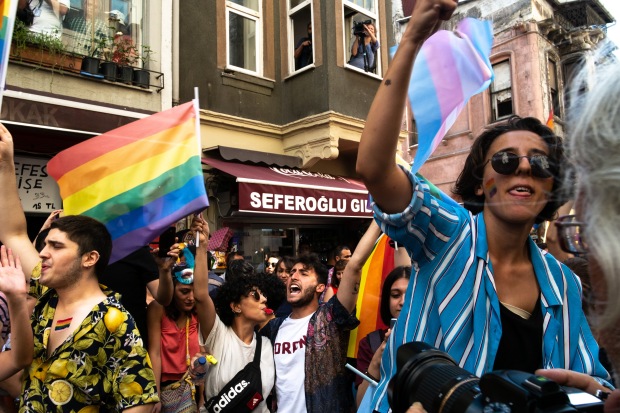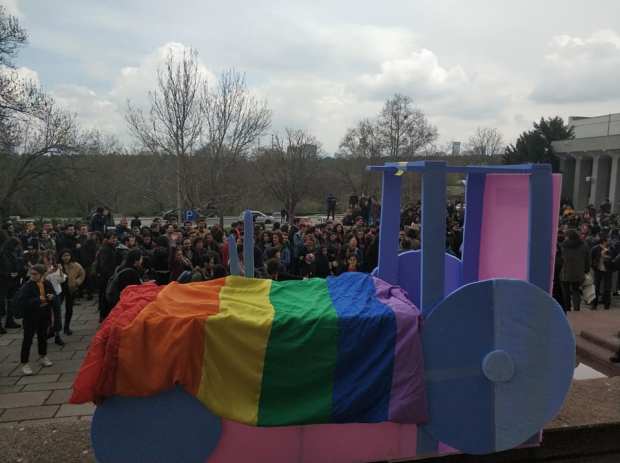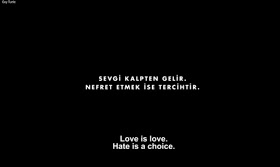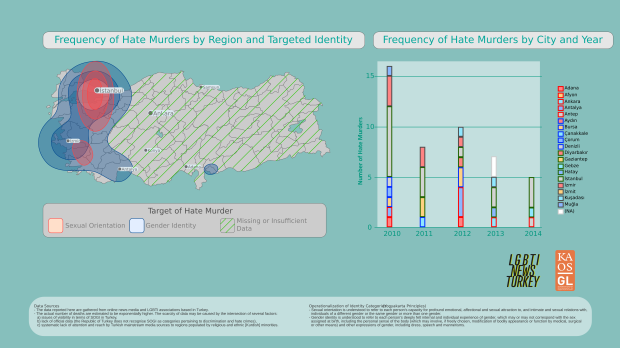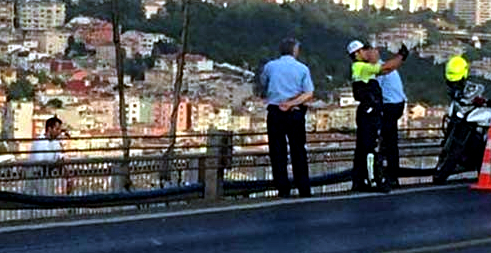The horizon looks bright in some regions of Turkey for future LGBTI+ Pride weeks and marches. New opportunities have emerged for Turkish LGBTI+ rights associations and activists to gain concessions from the police and the judiciary. This year’s pride events highlighted the strength, capacity and resilience of rights defenders, even in a hostile political environment.
LGBTI+ Pride weeks took place across Turkey, despite state repression and bans on public gatherings. From Istanbul to Mersin, LGBTI+ rights organisations and individual activists marked Pride across the country with defiance in celebration of their identities. Chants echoed across the country with the cries, “we are here, we are queer” and “where are you my love? / I am here my love”.
In many cities across Turkey activists and lawyers were able to win concessions from the police and judiciary making some of this year’s pride events the largest in years. However, in Gaziantep, a city in southeastern Turkey, no improvements were seen in recent years for LGBTI+ rights activists and the situation has even deteriorated since the official lifting of the State of Emergency.
In this article we will look at many of the Pride celebrations across Turkey, reporting the challenges as well as the successes of this year. Looking at the accomplishments of activists can open up new opportunities for Prides in the future.
Istanbul
The theme of this year’s Pride, EKONOMİ NE AYOL? (‘Economy? What’s that?’), focused on rising inflation in Turkey and the vulnerable position of LGBTI+ individuals in an economic crisis.
Between June 24-30 art exhibitions, picnics, film screenings, workshops and parties took place in 29 venues across the city. The variety of events set an inclusive atmosphere for people of all identities, with an emphasis on inclusion and peace building.
Early in the week Istanbul Pride Week Committee met with the Governor, who declined their request to hold Pride Walk in Taksim and stated that the LGBTI+ community was regarded as a “socially dubious group”. The Governor also declined a petition to have the Pride march celebrated in Bakırköy, another part of the city designated for demonstrations but less politically symbolic than Taksim.
On Sunday, June 30 without state permission, people were to meet in Taksim for the Pride Walk. Heavy police presence around Taksim and along Istiklal Avenue prevented people meeting on Taksim Square. However, the police consented to negotiate with some of the organisers, allowing the Pride to take place until 17:30 on Mis Sokak, a street near Taksim famous for its LGBTI+ friendly bars. A press statement was read there to sounds of hundreds of people cheering. One quote from the press statement was,
“We do not give up our lives, our solidarity, nor our organized struggle! We are here, get used to it, we are not going.”
At almost exactly 17:30 the police marched down Mis Sokak spraying the few people who remained with tear gas, rubber bullets and chasing them with dogs. A bar on Mis Sokak where people were continuing to celebrate was also sprayed with tear gas. Before the police attack, people were able to meet in security for over an hour. The police did not use water cannons as they had in previous years and some people taking part in the celebrations described the police as more restrained than in previous years.
As the Pride march was chased from Mis Sokak activists kept meeting in various neighborhoods of the central district of Beyoğlu, reading press statements and celebrating before eventually being dispersed again by the police. The defiance of the continual celebrations was in line with the message of Pride: we are here, we are everywhere.
Metehan Ozkan from LISTAG, an association which works with the parents of LGBTI+ individuals described this year’s Pride: “We had parents from Ankara, Izmir and Antalya parents groups, we had new members who had a chance to experience Pride for the first time with their children. Though the Pride was ‘limited’ it was very emotional for them.”
Mustafa Sarıyılmaz from SPoD, an Istanbul-based association focusing on social and psychological support for LGBTI+ individuals, said:
“Police was less brutal than last year. I might easily comment that what we had this year was a small gathering that we all missed and longed for a very long time. And, we now have our hope that we might be able to have our parade back in two year’s time. Because, these are all the signs that the movement in Turkey is getting stronger day by day. We have developed a huge solidarity between us now, which wasn’t the case before.”
That night two parties closed the Istanbul Pride, one was put on by Gzone Mag magazine involving trans and drag performers, the other event was hosted by local LGBTI+ DJs.
During the Istanbul Pride, six people were detained by police.
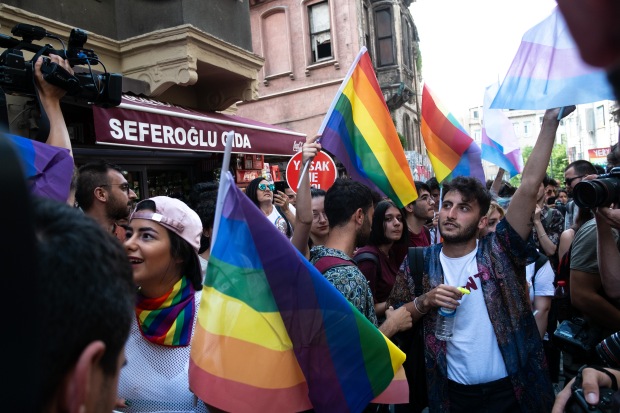
Ankara
An indefinite blanket ban against all LGBTI+ events was declared in the capital Ankara under the state of emergency on November 2017. Kaos GL made an appeal which the 12th Administrative Court used to re-examine the ban and ruled that the city governor did not have the legal power to issue bans of that kind. Although the ban was officially lifted, in practice it continued to be in effect.
On May 10, students at the Middle Eastern Technical University staged a Pride celebration despite the rectorate forbidding it. The celebrations were also dispersed by the police using tear gas and rubber bullets. Twenty-five people were detained including an academic working at the university. In reaction students released a press statement calling for “a ban on the bans”. A party was also held afterwards by the students involving drag performances, with the names of those arrested read aloud and applauded.
Some of these arrested students have subsequently had their student loans and assistance revoked on the recommendation of the Security Directorate to the Credits and Dorms Authority.
Izmir
The 7th İzmir Pride Week planned for June 17-23 was banned on June 14 by the Governorship of Izmir. However, an appeal by the association Genç LGBTİ+ (LGBTI+ Youth) repealed the ban allowing many of the planned events to take place. In the decision to prevent a ban on some of the Pride activities, one judge voted in favor of enforcing the ban and two votes were for the bans repeal. One of those two votes repealing the ban, commented that this decision should be applied to all Pride activities in İzmir.
However, the ban was not fully lifted for the Pride march nor for two events entitled “Bondage Workshop” and “Sex Toy Workshop”. Activists persisted in marching and negotiated with the police, winning the concession to read a press statement on Kıbrıs Şehitleri Avenue in the center of Izmir. However, after the press statement 17 activists were detained.
Gaziantep
In Gaziantep a blanket ban for 20 days on LGBTI+ events prevented Pride events from taking place. During Pride week activists were prevented from putting up a Pride rainbow flag in Çınarlı Park and police prevented activists reading a press statement at Yeşilsu Square. Instead, the Human Rights Association, IHD (Insan Hakları Derneği) hosted a Pride event to read the Pride’s press release:
“As long as you view our existence as a threat, we continue to say, ‘Every step of ours is a Pride March.’
“If it is your tradition to declare those who strive for an honorable and just life immoral and terrorists to cover up your “sins,” it is our tradition to not stop speaking, not stop and not obey.
“We know that what fuels your aggression is our power. We know in our struggle since the 1980s that you are trying to exploit the beauty of our togetherness.”
ZeugMadi Lgbt, an Antep based LGBTI+ Rights association told LGBTI+ News Turkey that for them there was no improvement in how Prides were experienced in previous years.
“In fact, the State of Emergency is still not over in Turkey. As LGBTI+ individuals we are still under martial law. Both socially and by the law. Harassment, incidents of rape, sexism, homophobia, transphobic rhetorics have all increased after the formal ending of the State of Emergency.”
Mersin
Despite a blanket ban on LGBTI+ events put into effect on June 25, the Mersin Pride still took place. Activists met in workshops and marched in small group unveiling Trans and LGBTI+ Pride flags in a few select spots across the city. Again, the defiance and determination of activists meant that few a short time in different parts of the city, LGBTI+ individuals were more visible.
Municipalities’ Official Support
From across Turkey, municipalities controlled by the main opposition party, CHP sent out greetings and support to Pride over social media. This occurred in the past but a larger number of municipalities sent out posts this year.
On this topic Mustafa Sarıyılmaz from SPoD reported to LGBTI+ News Turkey that
“Thirty-five municipalities around the country celebrated Pride over Twitter, it seems the visibility of queer community in Turkey has grown, in a positive way. Well, on the other hand, …. the director of religious affairs made all imams around Turkey curse LGBTI+’s in Friday prayers. Yet, we’re hopeful.”
Words by George Winter
Photos by Bradley Secker in the İstanbul Pride
29/07/2019 Correction: The article had previously stated that a Pride after party was put on by GQ magazine, this was incorrect. Gzone Mag put the party on.
